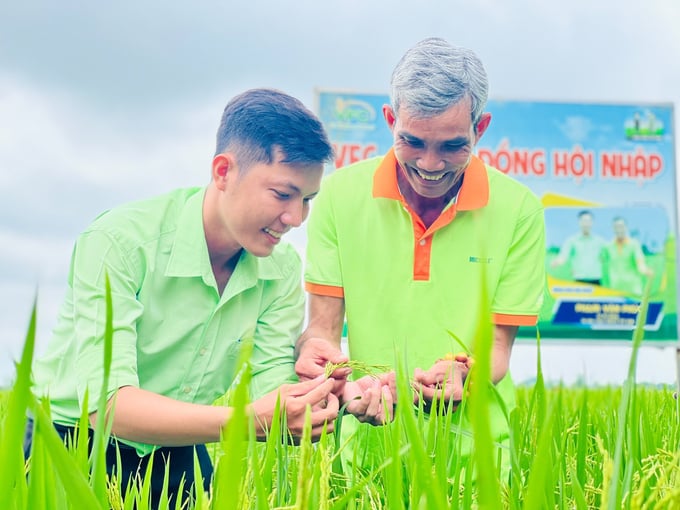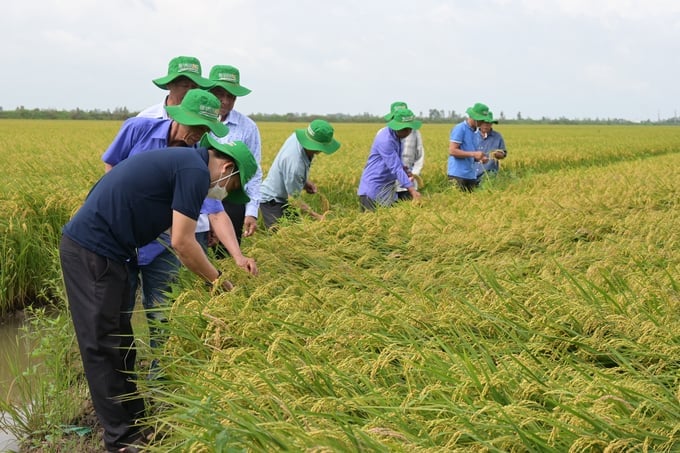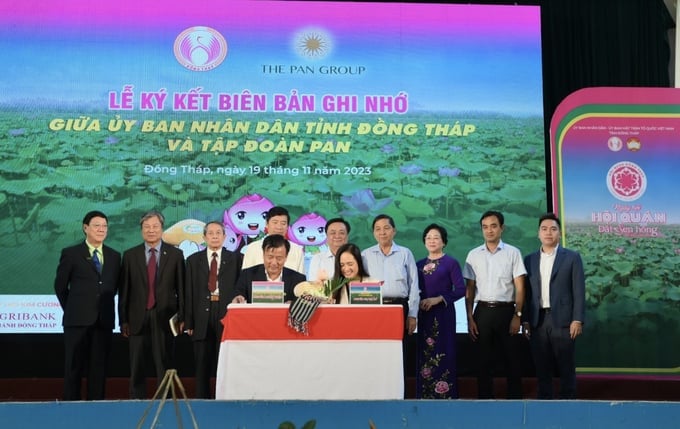May 31, 2025 | 05:24 GMT +7
May 31, 2025 | 05:24 GMT +7
Hotline: 0913.378.918
May 31, 2025 | 05:24 GMT +7
Hotline: 0913.378.918
Vietnam has consistently ranked among the top three largest rice exporters globally for several consecutive years. Notably, Vietnam's rice exports reached 7.17 million tons in 2022, with a total turnover of 3.49 billion USD, which is an increase of 6.2% compared to that in 2021.

Officials from the Vietnam Fumigation Joint Stock Company (VFC) - a member of the PAN Group, are providing technical cultivation guidance to farmers in the "Integrated Fields" Program.
The Mekong Delta region accounts for over 50% of Vietnam's total rice production and more than 90% of the country's rice exports. Additionally, the region is generating employment and income for over 1.5 million agricultural households. Dong Thap province stands out as a focal point for agricultural production within the region, leading the country in total rice yield.
Despite maintaining a significant global position, the state of rice production in the Mekong Delta harbors major sustainability risks. According to reports from local governments, only approximately 20% of the local agricultural land is integrated into value chains, and only a small number of these chains have exhibited indications of sustainability.
The rice value chain encompasses the stages of input material supplying, production, processing, distribution, and consumption. Participants in the value chain include farmers, traders, milling factories, supply companies, export companies, wholesale and retail networks. Related industries, services, infrastructure, and regulatory agencies all contribute significantly to a value chain.
According to various experts, the rice value chain in the Mekong Delta region is facing sustainability challenges, as exemplified by low production efficiency and farmer income, suboptimal rice quality, food safety concerns, and low competitiveness in the rice export market. Additionally, the transition from rice production to alternative land use with high economic efficiency has not been effectively implemented.

Farmers visiting and evaluating a 50-hectare integrated rice field in Tam Nong district, Dong Thap province, populated by DS1 rice variety from the Vietnam Rice Limited Liability Company.
Notably, the inefficient use of input materials, namely chemical fertilizers and pesticides, leads to increased production costs, reduced product quality, and a rise in greenhouse gas emissions.
Current rice production systems in the Mekong Delta region predominantly consist of small-scale and decentralized household operations. This poses obstacles to the adoption of advanced technologies in production, as well as to the integration of production, procurement, processing, and export activities. These issues severely hinders the establishment of large-scale raw material areas, thereby resulting in low consumption within integrated areas. As a result, breach of contracts between farmers and businesses have become a common occurrence.
Within an unsustainable rice value chain, farmers emerge as the most crucial albeit the most vulnerable component, influencing the outcomes of the entire agricultural production process.
Farmers relied heavily on traditional production practices and personal experimentation on family-owned fields in the past. Moreover, they are highly dependent on weather conditions and face the greatest losses when input prices rise or output prices fall. During market fluctuations and price increases, rice farmers benefit the least from their production.
For instance, due to heavy reliance on chemical fertilizers and pesticides, with the increase in input costs (fertilizer rising by 64-150%, pesticides increasing by 4-60%) since 2021, coupled with rising transportation and harvesting costs, the total cost of rice production increased by 23% in 2022, reaching 23.6 million Vietnamese dong per hectare. Consequently, farmers suffered a decrease of 21% in profit compared to that in 2018, amounting to 14.5 million Vietnamese dong per hectare.
In reality, farmers represent the lowest-income group in society, with their income being less than one-third of the average income of industrial and service labor. The poverty rate is primarily concentrated in rural populations, with over 90% of the country's poor households residing in rural areas, particularly in ethnic minority and mountainous regions.
In order to fundamentally alter the individualistic and spontaneous state of agricultural production, it is essential to develop a sustainable value chain. This effort must involve a closely-coordinated cooperative mechanism, thereby ensuring mutual benefits among all components within the value chain, with farmers being the most crucial stakeholders.
Multiple solutions have been proposed to enhance farmers' income, such as cost savings, increased labor productivity, and raised purchasing prices from businesses. However, the Mekong Delta region requires comprehensive and sustainable solutions whereby all components within the chain can mutually benefit beyond simple procurement linkages.
Several businesses have initiated projects towards serving this goal. Namely, Vietnam Fumigation Joint Stock Company (VFC) - a member of the PAN Group, has implemented a long-term program titled "Integrated Fields" since 2012. Originating from the "Supporting Farmers" project, the program, in collaboration with the Cuu Long Delta Rice Research Institute, has been accompanying farmers for over ten years, conducting over 1,000 seasonal technical training sessions and providing opportunities for over 100,000 farmers through multi-staged campaigns.
With the new production process under the "Integrated Fields," profits have increased by 25%, which is equivalent to 14 million Vietnamese dong per hectare. On the other hand, total production costs have decreased by 10%, and productivity has increased by an additional 8% to reach approximately 1.5 tons per hectare.
By utilizing the strengths of members within the PAN Group's ecosystem, VFC has collaborated with Vietnam Rice Company Limited (Vinarice) to establish a supply chain model, offering optimal agricultural solutions, ensuring stable outputs, and developing a rice brand. This solution has served as the foundation for a larger-scale initiative.
Dong Thap Provincial People's Committee and the PAN Group signed a Memorandum of Understanding on November 19 to collaborate on implementing the project "Enhancing Income for Rice Frowers." The project's objective is to create a close linkage between farmers, cooperatives, and businesses through sustainable agricultural solutions, thereby establishing and developing a closed-loop rice value chain, reducing greenhouse gas emissions, and increasing the income of rice farmers.

PAN Group signing a cooperation agreement with Dong Thap province to implement the project aimed at enhancing the income of rice farmers.
Regarding rice varieties, PAN Group will closely collaborate with Dong Thap province to establish a seasonal structure and suitable rice varieties for each ecological region.
Regarding technology, PAN Group will transfer advanced technologies and organize training programs to enhance farmers' knowledge during the planning and implementation of high-quality, sustainable and commercial seed and rice production. The Group will provide supplies and technical support to farmers to ensure that the production process follows established standards.
Regarding plant protection products, PAN Group and its subsidiaries will supply high-quality plant protection products with certified origins from reputable global suppliers at preferential prices. They will also guide local farmers on spraying techniques and the proper use of pesticides to save costs and ensure safety.
PAN Group will provide support in terms of market for products which adhere to established procedures, production practices, and meet quality standards in the regions where the PAN Group operates.
Additionally, the Group will proactively invite leading partners in the fertilizer and high-tech agriculture sectors to collaborate within the scope of the project.
The project aims to increase profits for rice farmers in Dong Thap province by over 30% of total revenue by 2025, which marks an increase of 30% in profit margins compared to 2022, or 3.6 trillion Vietnamese dong.
Regarding rice production area, the project's goal is to ensure a profit increase for 240,000 out of 470,940 hectares (or 50% of the total production area per year). Furthermore, it aims to increase the rate of synchronized mechanization by using cluster seeding machines, raising the mechanization rate in the seeding phase with machines to at least 50% of the production area and utilizing unmanned aerial vehicles in pesticide spraying on a minimum of 70% of the production area. The project also aims to reduce the use of chemical fertilizers and pesticides in rice production by at least 30% compared to 2020. Additionally, post-harvest straw will be collected, reused, and processed on over 80% of the harvested area.
Ms. Nguyen Thi Tra My, CEO of the PAN Group, stated: "This is a closed-loop value chain model, where farmers are provided with sustainable agricultural solutions from the input stage with quality seeds, standard production processes, pest and disease prevention solutions, and fertilizers. Subsequently, production is developed in combination with marketing and brand-building for the final agricultural product. The solutions aim to reduce input costs while maximizing productivity and quality."
With the participation of the PAN Group, the project can change the farmers' mindset and their production practices in rice production as well as agriculture as a whole. The project is expected to help farmers shift from traditional to high-level rice production where the value of rice is increased in a sustainable chain. Consequently, this effort will raise the income levels of farmers and improve environmental quality.
Translated by Nguyen Hai Long

(VAN) Several scientists and farmers are experimenting with soil treatment in some key durian-growing regions such as Cai Lay (Tien Giang), Dak Song, Gia Nghia, and Dak R’lap (Dak Nong).
/2025/05/25/4127-3-073637_820.jpg)
(VAN) Thanks to the promotion from an FAO-implemented project, vegetable production in greenhouses in Moc Chau has seen strong development, from 1.5 hectares in 2021 to nearly 50 hectares in 2024.

(VAN) FAO has recently supported USD 140,000 to implement the project 'Risk mitigation human-animal interface risks through disease control initiatives in pig farming.'

(VAN) The People's Committee of Tra Vinh province has approved an adjustment to the investment policy for the Green Hydrogen Plant project, increasing its area to approximately 52.76 hectares.
![Reducing emissions from rice fields: [2] Farmers’ commitment to the soil](https://t.ex-cdn.com/nongnghiepmoitruong.vn/608w/files/news/2025/05/05/dsc08881jpg-nongnghiep-140632.jpg)
(VAN) Clean rice cultivation model in Thuong Tan commune, Bac Tan Uyen district, is assisting local residents in achieving sustainable agriculture by substantially reducing costs, increasing productivity, and protecting the environment.

(VAN) At the conference to disseminate Resolution No. 68, AgriS introduced its digital agricultural ecosystem and reaffirmed its commitment to accompanying the Government in promoting private sector development and sustainable agriculture.

(VAN) 'Blue Ocean - Blue Foods' initiative is designed to restore marine ecosystems and establish sustainable livelihoods for local communities by cultivating a minimum of 1,000 hectares of cottonii seaweed in the first three years.